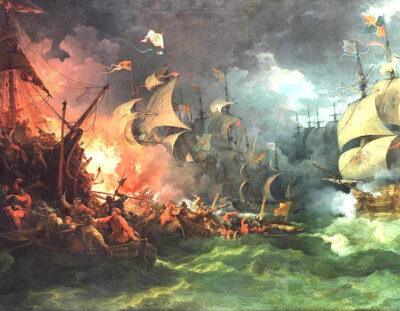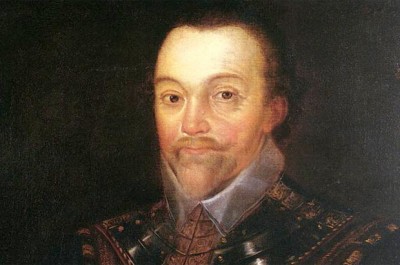|
Listen To The Article
|
The greatest spiritual endeavors and achievements in the past
have been those energized by faith and hope.
—Ian Murray, The Puritan Hope (1971)
Most Christians don’t know the power of their own faith.
They think like underdogs and that has real world consequences.
—Malcolm Gladwell, at the Catalyst Conference (2013)
Drake’s Faith

Sir Francis Drake and the English defeat the Spanish Armada.
In the epilogue of his best-selling classic, The Armada (1959), Garrett Mattingly writes that “Drake and his fellow Puritans dreamed of spreading the religious revolution throughout Europe until Anti-Christ was hurled from his throne” (page 399). Strictly speaking, Drake wasn’t a Puritan, but he was most certainly an evangelical Protestant and an enemy of all things connected with the Inquisition. Like all Protestants, he believed the pope was the Antichrist. And long before Elizabeth was ready for all out war, Drake began his own personal war with Roman Catholic Spain. He was moved by family history, by his understanding of Scripture, and by the writings of his spiritual mentor, John Foxe. As part of his crusade, he insisted on morality and decency from his crew and required his men to attend ship’s prayers, morning and evening. Though his ships always had chaplains, Drake often insisted on preaching or reading the Bible aloud himself. Faith in Christ was his personal concern.
If Drake were an historical nonentity, his religious convictions wouldn’t concern us. But Sir Francis played a major role in three history-altering, though often forgotten struggles: the colonization of America’s eastern seaboard; the defeat of the Spanish Armada; and the preservation of the Protestant Netherlands. Beyond that, his career proved a source of inspiration for Englishmen and Protestants for centuries.
The Colonization of North America
In 1586 on his way home from the Caribbean, Drake and his fleet came upon the Spanish settlement of St. Augustine in what is now Florida. Drake knew that the Spanish had destroyed an earlier Huguenot settlement in this area. He saw the forte at St. Augustine as a last chance for plunder and as an opportunity to avenge his fellow Protestants.
When Drake’s men landed, they discovered one of the few Frenchmen who had survived the massacre, Nicholas Borgoignon. He told them that the Spanish had fled St. Augustine and led them to it. But along the way, Drake lost a man to sniper fire. He refused to let his men engage the Spanish any further. Instead, he ordered the town burnt, together with its crops. Drake and his men retreated to their ships with a chest of gold and whatever tools as they could find—the latter a gift for Roanoke. Drake’s fleet sailed north to Virginia. Though he was unable to resupply the Roanoke colony, Drake took aboard his ships those who wished to return to England.
Rumors circulated throughout the Spanish settlements to the south: the English had planted a colony to the north and had made it a base for piracy. Freed Spanish prisoners confirmed that Drake had hoped to supply and strengthen the English colony at Roanoke.
Fearing another raid, Spain determined that all her efforts on America’s eastern seaboard would be concentrated in one place, St. Augustine. Spain abandoned her settlements in what is now South Carolina—Parris Island and Santa Elena. She never ventured north again.
The Spanish Armada and Its Aftermath

Sir Francis Drake
When England’s relations with Spain further deteriorated and war seemed at hand, Elizabeth sent Drake on a series of raids against the Spanish Main. The plan was to deter Philip from visions of conquest. In that regard, Drake’s strikes only bought time. Philip began to construct and assemble his Armada, a huge fleet of war ships aimed at England.
Philip wanted to subdue England, end English support to the Protestant Netherlands, and deal a fatal blow to the Reformation in Britain and Holland. In 1588 the Armada set sail.
Though Lord Howard was fleet commander, Drake was next in command and played a crucial role in keeping the Armada off balance, luring it out into untoward winds, and blasting the decks of its ships with ongoing broadsides. God’s winds did the rest.
Though the defeat of the Armada certainly didn’t end the war with Spain, it did ensure that England would remain Protestant. And that meant that continued English support to the Dutch. Had the Armada succeeded, had England fallen, the Netherlands would have stood alone. In the end, the Dutch rebellion would have failed. Protestant Christianity there would have been driven underground or extinguished altogether. And, as a further consequence, there would have been no safe haven in the Netherlands for the English Separatists we know as the Pilgrims.
The Psychology of Victory
We must also consider the broader effects of Drake’s life. He stood up to the Spanish. He turned back their fleet. He weakened the Inquisition by plundering their ships and settlements. He sailed around the world. He claimed a distant part of the New World for the Queen. He was a hero, and he did what heroes always do: by example, he summoned others to follow in his steps.
In a recent radio interview, historian Susan Jackson from the Drake’s Exploration Society says this:
The fact that Drake took Nova Albion in the name of the Queen, even though they didn’t have the resources to follow it up, as far as England was concerned, they’ve got a foothold on the North American mainland. And it gave the impetus—Drake really gave the impetus to Raleigh and [Sir Richard] Grenville to carry on where he left off. . . . But what he couldn’t do personally, he invested in other voyages. He invested in the Roanoke voyage, and it was he who went to Roanoke’s help on his way back from his West Indian voyage.
Drake was committed to the expansion of Christ’s kingdom. He supported that expansion on the seas, with his wealth, and by his example. He inspired generations of Englishmen and Christians to take on a wider and longer vision of the kingdom of God.
The Scrooby Link
British historian Sue Allan gives us a surprising link from Drake to the Armada to the American Pilgrims. She begins with the assumption that a victory for Philip would have followed the same course as his late wife’s reign. You see, Philip had been Mary’s husband and co-regent of England. First the Protestant clergy would have been rounded up, Allan argues, “Followed very quickly by anyone who had offended Philip. The Queen, Elizabeth, would have been removed very promptly and probably executed. But also her court—and one person in particular in her court would have had special attention. That was a secretary of state, William Davison. When he was secretary of state to Elizabeth, he had had to serve the death warrant for Mary, Queen of Scots.”
Davison would have been executed. Those who worked for him would have come under close scrutiny. They would have certainly lost their positions and most likely their lives. And who worked for Davison? William Brewster.
Davison and Brewster
“Brewster seems to have been almost a surrogate son for Davison. He had groomed this man, this young man, to become a career diplomat like himself, and there was a very strong bond between them—and probably spiritual as well, because Davison is known to have been a staunch Puritan, so they probably shared a lot of religious beliefs as well.”
Brewster was a Cambridge man, well educated, very astute and capable. He was a man who got things done. He was also the protector of a group of Separatists who met at Scrooby. That congregation eventually became the American Pilgrims, and Brewster became the congregation’s elder and a close advisor to Plymouth’s perennial governor, William Bradford. So if Philip had taken England, Brewster would have been on his black list at best. Most likely he would have been executed. Either way, he would have been in no position to protect and work with the Scrooby Separatists. No Drake, no Brewster. No Pilgrims.
According to Susan Jackson, there’s another possible connection between Drake and the Pilgrims. We have records of two ships privately owned but attached to Drake’s squadron. One was called the Mayflower and the other, the Speedwell. These, of course, were the names of the two ships originally hired to bring the Pilgrims to America.
Conclusion
Without Drake, there would have been no Pilgrims. The Netherlands would have remained beneath the heel of Spain. The United States as we know it would never have been born. Spain would have inherited all of North America.
Drake’s faith, courage, and skill inspired a nation, pushed back Spanish colonization of the America’s eastern seaboard, preserved the Protestant faith in England and Holland, and made Plymouth Plantation possible.
Did Drake intend all these consequences? Probably not. But he was moved by vision; that is, by faith. Drake’s theology, like that of the Pilgrim’s, centered on a sovereign God whose very sovereignty required His faithful servants to take practical, even daring, action. Drake moved boldly in the present because of a future he could only see by faith. In consequence, he changed the world and helped give birth to the American Republic.
For Further Reading and Listening:
Susan Jackson, interview with Bill Heid
Susan Allan, interview with Bill Heid
Ernle Bradford, The Wind Commands Me (New York: Harcort, Brace & World, Inc., 1965).
John Sugden, Sir Francis Drake (London: Random House, 2006).
William Wood, Elizabethan Sea-Dogs: A Chronicle of Drake and His Companions (Cambridge, MA: Yale University Press, 1918).
Samuel Bawlf, The Secret Voyage of Sir Francis Drake (New York: Bloomsbury Publishing Plc., 2003).
Otto Scott, The Great Christian Revolution, How Christianity Transformed the World (Windsor, NY: The Reformer Library, 1994).
 Off The Grid News Better Ideas For Off The Grid Living
Off The Grid News Better Ideas For Off The Grid Living





